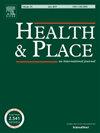Period poverty: Menstrual information, product selection, and disposal among urban female nursing students in Bangladesh
IF 4.1
2区 医学
Q1 PUBLIC, ENVIRONMENTAL & OCCUPATIONAL HEALTH
引用次数: 0
Abstract
Period poverty, the lack of access to menstrual hygiene products, sanitation facilities, and education, remains a pressing issue in low- and middle-income countries. This study explored the emotional and practical challenges faced by nursing students, focusing on menstrual education, product accessibility, and disposal practices. A qualitative approach was adopted, involving 35 female nursing students (aged 26 ± 3.3 years) from seven government nursing colleges across three regions of Bangladesh. Data was collected from June to July 2023 through Focus Group Discussions (FGDs) and In-Depth Interviews (IDIs). Purposive sampling was employed for FGDs, while convenience was sampling used for IDIs. Thematic analysis, facilitated by MAXQDA2023 software, identified key themes and subthemes related to menstrual experiences. Three major themes emerged: (1) fear and confusion during first menstruation, (2) barriers to menstrual product accessibility, and (3) challenges in menstrual hygiene management. Many students reported fear and confusion during their first menstruation, largely due to inadequate information from female family members, especially mothers. Sanitary pads were the preferred menstrual product, but the embarrassment of buying products in front of men often made purchasing them difficult and they used old clothes. Additionally, a lack of proper disposal facilities and embarrassment in managing menstruation in public were significant concerns. This study underscores the need for comprehensive menstrual education and improved Water, Sanitation and Hygiene (WASH) infrastructure in educational institutions. Addressing these issues is critical to promoting safe and dignified menstrual management, reducing stigma, and enhancing health outcomes for menstruators.
经期贫困:孟加拉国城市女护生的经期信息、产品选择和处理
经期贫困,即缺乏获得经期卫生用品、卫生设施和教育的机会,仍然是低收入和中等收入国家的一个紧迫问题。本研究探讨了护理专业学生面临的情感和实践挑战,重点关注月经教育,产品可及性和处理实践。采用定性方法,研究对象为来自孟加拉国三个地区七所政府护理学院的35名女护理专业学生(年龄26±3.3岁)。数据从2023年6月至7月通过焦点小组讨论(fgd)和深度访谈(IDIs)收集。fgd采用目的性抽样,idi采用便利性抽样。通过MAXQDA2023软件进行主题分析,确定了与月经体验相关的主要主题和次主题。出现了三个主要主题:(1)第一次月经时的恐惧和困惑;(2)月经产品的可及性障碍;(3)月经卫生管理方面的挑战。许多学生报告说,她们在第一次月经时感到恐惧和困惑,这在很大程度上是由于女性家庭成员,尤其是母亲提供的信息不足。卫生巾是首选的月经用品,但在男性面前购买产品的尴尬往往使购买困难,他们使用旧衣服。此外,缺乏适当的处理设施和在公共场合处理月经的尴尬是重大问题。这项研究强调需要全面的月经教育和改善教育机构的水、环境卫生和个人卫生基础设施。解决这些问题对于促进安全和有尊严的经期管理、减少耻辱感和提高经期妇女的健康结果至关重要。
本文章由计算机程序翻译,如有差异,请以英文原文为准。
求助全文
约1分钟内获得全文
求助全文
来源期刊

Health & Place
PUBLIC, ENVIRONMENTAL & OCCUPATIONAL HEALTH-
CiteScore
7.70
自引率
6.20%
发文量
176
审稿时长
29 days
期刊介绍:
he journal is an interdisciplinary journal dedicated to the study of all aspects of health and health care in which place or location matters.
 求助内容:
求助内容: 应助结果提醒方式:
应助结果提醒方式:


